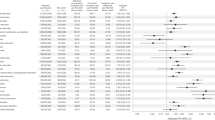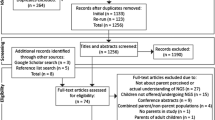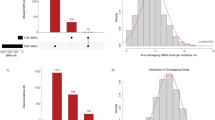Abstract
Little is known about the psychosocial consequences of testing newborns for genetic susceptibility to multifactorial diseases. This study reports quantitative psychosocial evaluations of parents and children 12 years after screening for type 1 diabetes (T1D). Two parent-child cohorts participated: children at increased genetic risk of T1D and children at low genetic risk. T1D risk status was determined at birth as part of a prospective study investigating potential environmental triggers of autoimmunity. Parent measures included ratings of children’s emotional, behavioural and social functioning (Child Behaviour Checklist) and parenting style (Alabama Parenting Questionnaire). Child self-concept was assessed using the self-description questionnaire (SDQ1). Statistical analyses were conducted to test for differences between the groups. Twelve years after testing there was no evidence that knowledge of a child’s increased genetic risk of T1D adversely affected parental ratings of their child’s emotional, behavioural or social functioning, or impacted upon parenting style. There was no adverse effect upon the child’s assessment of their self-concept. This study provides important preliminary data concerning longer-term psychosocial effects of incorporating tests for genetic risk of complex disorders into NBS panels. While it is reassuring that no significant adverse effects have been detected, more data will be required to adequately inform policy.
Similar content being viewed by others
Log in or create a free account to read this content
Gain free access to this article, as well as selected content from this journal and more on nature.com
or
References
Health NIo: NIH program explores the use of genomic sequencing in newborn healthcare. News release 2013.
Collins F : The language of life: DNA and the revolution in personalised medicine. New York: Harper perennial, 2010.
Hall AE, Chowdhury S, Pashayan N, Hallowell N, Pharoah P, Burton H : What ethical and legal principles should guide the genotyping of children as part of a personalised screening programme for common cancer? J Med Ethics 2014; 40: 163–167.
Knoppers BM, Senecal K, Borry P, Avard D : Whole-genome sequencing in newborn screening programs. Sci transl med 2014; 6: 229cm2.
Howard HC, Knoppers BM, Cornel MC et al: . Whole-genome sequencing in newborn screening? A statement on the continued importance of targeted approaches in newborn screening programmes. Eur J Hum Genet 2015; 23: 1593–1600.
Wakefield CE, Hanlon LV, Tucker KM et al: The psychological impact of genetic information on children: a systematic review. Genet Med 2016; 18: 755–762.
Wade CH, Wilfond BS, McBride CM : Effects of genetic risk information on children's psychosocial wellbeing: a systematic review of the literature. Genet med 2010; 12: 317–326.
Hagopian W, Erlich H, Lernmark A et al: The Environmental Determinants of Diabetes in the Young (TEDDY): genetic criteria and international diabetes risk screening of 421 000 infants. Pediatr Diabetes 2011; 12: 733–743.
Carmichael SK, Johnson SB, Baughcum A et al: Prospective assessment in newborns of diabetes autoimmunity (PANDA): maternal understanding of infant diabetes risk. Genet Med 2003; 5: 77–83.
Kerruish NJ, Campbell-Stokes PL, Gray A, Merriman TR, Robertson SP, Taylor BJ : Maternal psychological reaction to newborn genetic screening for type 1 diabetes. Pediatrics 2007; 120: e324–e335.
Kerruish NJ : Parents' experiences of newborn screening for genetic susceptibility to type 1 diabetes. J Med Ethics 2011; 37: 348–353.
Kerruish N : Parents' experiences 12 years after newborn screening for genetic susceptibility to type 1 diabetes and their attitudes to whole-genome sequencing in newborns. Genet Med 2015; 18: 249–258.
Devendra D, Liu E, Eisenbarth GS : Type 1 diabetes: recent developments. Bmj 2004; 328: 750–754.
Achenbach T, Rescoria L : Manual for the ASEBA school age forms and profiles. Burlington, VT: University of vermont, Research center for children, youth and families, 2001.
Bellina M, Brambilla P, Garzitto M, Negri GA, Molteni M, Nobile M : The ability of CBCL DSM-oriented scales to predict DSM-IV diagnoses in a referred sample of children and adolescents. Eur Child Adolesc Psychiatry 2013; 22: 235–246.
Pesenti-Gritti P, Scaini S, D'Ippolito C, Fagnani C, Battaglia M : A genetically informed study of the covariation between the CBCL/6-18 DSM-oriented problem scales and the competence scales. Behav genet 2011; 41: 522–532.
Nakamura B, Ebesutani C, Bernstein A, Chorpita B : A psychometric analysis of the child behavior checklist DSM-oriented scales. J Psychopathol Behav Assess 2009; 31: 178–189.
Mazefsky C, Anderson RR, Conner C, Minshew N : Child behaviour checklist scores for school aged children with autism: preliminary evidence of patterns suggesting the need for referral. J psychopathol Behav assess 2011; 33: 31–37.
Shelton K, Frick P, Wootoa J : Assessment of parenting practices in families of elementary school age children. J clin child psychol 1996; 25: 317–329.
Dadds M, Maujean A, Fraser J : Parenting and conduct problems in children: Australian data and psychometric properties of the Alabama parenting Questionnaire. Aust psychol 38: 238–241.
Marsh H (ed): Self Description Questionnaire (SDQ) 1: A Theoretical and Empirical Basis for Measurement of Multiple Dimensions of Preadolescent self concept: An interim Test Manual and Research Monograph. Macarthur: Faculty of education, University of western Sydney, 1992.
Shavelson R, Hubner J, Stanton G : Self concept: validation of construct interpretations of test scores. Rev educ Res 1976; 46: 407–441.
McBride CM, Koehly LM, Sanderson SC, Kaphingst KA : The behavioral response to personalized genetic information: will genetic risk profiles motivate individuals and families to choose more healthful behaviors? Annu Rev Public Health 31: 89–103.
Hopwood P : Breast cancer risk perception: what do we know and understand? Breast Cancer Res 2000; 2: 387–391.
Heshka JT, Palleschi C, Howley H, Wilson B, Wells PS : A systematic review of perceived risks, psychological and behavioral impacts of genetic testing. Genet Med 2008; 10: 19–32.
Hood KK, Johnson SB, Baughcum AE, She JX, Schatz DA : Maternal understanding of infant diabetes risk: differential effects of maternal anxiety and depression. Genet Med 2006; 8: 665–670.
Metcalfe A, Coad J, Plumridge GM, Gill P, Farndon P : Family communication between children and their parents about inherited genetic conditions: a meta-synthesis of the research. Eur J Hum Genet 2008; 16: 1193–1200.
Metcalfe A, Plumridge G, Coad J, Shanks A, Gill P : Parents' and children's communication about genetic risk: a qualitative study, learning from families' experiences. Eur J Hum Genet 2011; 19: 640–646.
Nolan TM, Bond L, Adler R et al: Child Behaviour Checklist classification of behaviour disorder. J Paediatr Child Health. 1996; 32: 405–411.
Grootenhuis M, Last B, van Der Wel M, de Graaf-Nikerk J : Parents' attribution of positive characteristics to their child with cancer. Psychol Health 1998; 13.
Pinquart M : Do the parent–child relationship and parenting behaviors differ between families with a child with and without chronic illness? A meta analysis. J Pediatr Psychol 2013; 38: 708–721.
Wilfond BS, Diekema DS : Engaging children in genomics research: decoding the meaning of assent in research. Genet med 2012; 14: 437–443.
Smets EM, Stam MM, Meulenkamp TM et al: Health-related quality of life of children with a positive carrier status for inherited cardiovascular diseases. Am j med genet. Part A 2008; 146A: 700–707.
Acknowledgements
This study was funded by a University of Otago Research Grant. The authors are grateful to Jane Columb and Shirley Jones (research nurses) for assistance with data collection.
Author information
Authors and Affiliations
Corresponding author
Ethics declarations
Competing interests
The authors declare no conflict of interest.
Rights and permissions
About this article
Cite this article
Kerruish, N., Healey, D. & Gray, A. Psychosocial effects in parents and children 12 years after newborn genetic screening for type 1 diabetes. Eur J Hum Genet 25, 397–403 (2017). https://doi.org/10.1038/ejhg.2016.190
Received:
Revised:
Accepted:
Published:
Issue date:
DOI: https://doi.org/10.1038/ejhg.2016.190
This article is cited by
-
Parents’ perspectives on expanded newborn genomic screening in Abu Dhabi, United Arab Emirates
Human Genomics (2025)
-
Psychological Impact of Screening for Risk of Type 1 Diabetes: an Update
Current Diabetes Reports (2025)
-
Früherkennungsuntersuchungen zum Typ-1-Diabetes
Der Diabetologe (2018)



